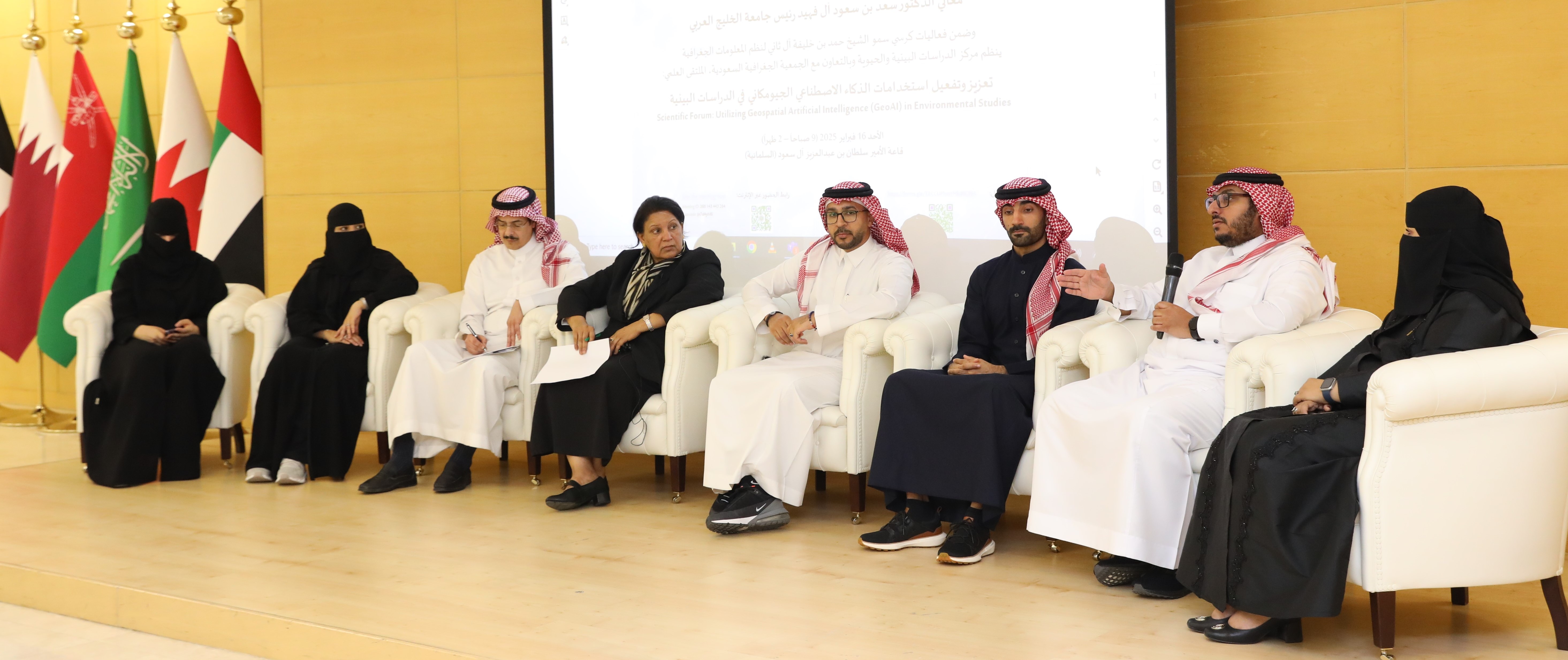
GIS Chair of His Highness Shaikh Hamad bin Khalifa Al Thani Calls for Activating GeoAI in Environmental Studies
Arabian Gulf University
17 Feb, 2025
The activities of the Scientific Forum organised by the university in cooperation with the Saudi Geographical Society (SGS) and King Saud University launched yesterday at the Arabian Gulf University (AGU). The speakers discussed "Enhancing and Activating Uses of Geospatial Artificial Intelligence (GeoAI) in Environmental Studies" as part of the activities of His Highness Shaikh Hamad bin Khalifa Al Thani Chair in Geographic Information Systems (GIS), hosted by AGU since 1997.
During the opening of the forum, the Vice President for Academic Affairs and Scientific Research at AGU, Dr Ghazi bin Abdulrahman Al Otaibi, welcomed the partnership with SGS, noting that this partnership harmonises with the university's goals of enhancing Gulf capabilities to keep pace with scientific and technical developments, especially in the field of geospatial technologies.
Al Otaibi stressed that these new technologies are fundamental in analysing environmental patterns and trends, which enhances the decision-making process in various fields such as urban planning, environmental monitoring, climate change, and natural and human disaster management.
"This contributes to sustainable development. The forum represents an opportunity to exchange experiences and discuss the latest developments in using GeoAI in environmental studies," he stated.
He called for strengthening the role of Gulf universities in keeping pace with the Fourth Industrial Revolution, including these requirements in educational curricula, which realises the goals of comprehensive development in the Gulf region.
For his part, Dean of the College of Education, Administrative and Technical Sciences, Professor Waleed Zubari, explained that this scientific forum is part of a series of events organised by the university within the framework of promoting scientific research and innovation in various fields. He commended the support provided to GIS Chair of His Highness Shaikh Hamad bin Khalifa Al Thani by the State of Qatar, which reflects its interest in supporting the scientific and research process in the region.
He praised the importance of the partnership with the SGS, which cooperated with the Centre for Environmental and Biological Studies at the university in organising this forum, which enhances scientific cooperation between local and regional institutions. He also pointed out that the forum comes within the framework of the university's strategic direction in integrating modern technologies into curricula with the aim of enabling students and researchers to face future challenges, noting that GeoAI represents a powerful tool for analysing environmental data and making innovative decisions in managing natural resources, in addition to its contribution to various fields such as public health, transportation and smart city planning.
In the context of the forum's activities, the President of SGS, Dr Ali Abdullah Al Dosari, stressed the importance of enhancing scientific research and innovation in various fields, since activating partnerships between academic institutions enhances the exchange of expertise and knowledge, and contributes to innovative solutions to environmental challenges in the region. He added that GeoAI is a powerful tool for analysing environmental data and making innovative decisions in natural resource management, calling for the integration of modern technologies into curricula in order to enable students and researchers to face future challenges.
The Academic Supervisor of the GIS Chair of His Highness Shaikh Hamad bin Khalifa Al Thani, Associate Professor of GIS and Environment at the College of Education, Administrative Sciences and Technology, Dr Sabah Al Jenaid, stressed the growing importance of GeoAI in improving GIS applications, pointing to the role of this technology in enhancing scientific research and achieving innovative practical results.
She explained that the forum aims to explore the dimensions of these modern technologies and how they synergise with GIS, which improves the utilisation of GeoAI capabilities and their significant impact on applied research in this field.
She stressed the need for higher education to keep pace with global transformations in the fields of automation and technology, affirming that higher education must embrace transformations that will greatly impact the labour market in the future, especially in areas such as AI, big data, and cybersecurity, so that future generations are prepared to face these transformations.
During the forum sessions, Dr Dabiah Ahmed Alboaineen, Assistant Professor in Cloud Computing and AI at Imam Abdulrahman bin Faisal University, spoke about the opportunities and challenges in the world of GeoAI. Dr Fatima Al Shahri, AI Consultant, reviewed the role of large language processors in analysing geospatial data, while Dr Manaf Alkhuzaei, Researched of GeoAI in land and marine environments, spoke about enhancing spatial data analysis. Dr Ahmed Mohammed Fallatah, Deputy Director of the Centre of Excellence in Environment Studies at King Abdulaziz University, spoke about using GeoAI for sustainable management of historical sites. The forum concluded with a presentation on the methodology for developing GeoAI presented by Ms Haifa Ibrahim Alibrahim, AI Consultant at the Ministry of Justice in the Kingdom of Saudi Arabia.
At the conclusion of the forum, participants discussed ways to activate the sciences and applications of geospatial technologies, emphasising the importance of knowledge transfer and collaboration in order to accelerate the pace of skill acquisition for researchers and graduate students, increasing their awareness of the latest developments in the uses of GeoAI in their future studies and research.
